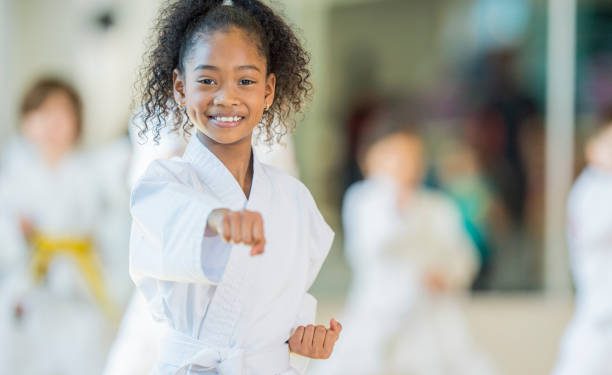The attempt to instill fundamental life skills in children has become increasingly important at a time when distractions abound and attention spans are stretched. Karate, taekwondo, judo, and jiu-jitsu are just a few of the disciplines that make up Mixed Martial Arts (MMA), which is a potent tool for developing character traits and improving focus in young people.
The foundation of mixed martial arts (MMA), karate, is more than just physical exercise. It helps children develop comprehensively by teaching them character traits and bolstering their mental toughness. Children in a dojo acquire important lessons in self-defense, discipline, respect, and perseverance in addition to learning these life skills in a disciplined setting.
This investigation explores the significant influence of karate in mixed martial arts, shedding light on how it fuels the development of character and steady concentration in our karate children's developing brains.
The Foundations of Mixed Martial Arts for Children
Mixed Martial Arts (MMA) is an innovative combination of many fighting methods that provides a holistic approach to character development, mental toughness, and physical fitness, especially for kids. In mixed martial arts (MMA), the integration of multiple disciplines—karate, judo, jiu-jitsu, and more—acts as a cornerstone for developing a solid foundation in novice practitioners.
1. Understanding Mixed Martial Arts (MMA)
Through the merging of techniques from several disciplines, mixed martial arts (MMA) introduces kids to the diverse world of martial arts. They can explore different styles, comprehend various moves, and recognize the many cultural roots of every martial art thanks to this comprehensive approach.
2. Karate as a Fundamental Component
Karate is one of the many different disciplines that are contained under mixed martial arts (MMA). This traditional martial art has a strong emphasis on deliberate motions, mental focus, and striking methods. Children who practice it gain good balance, coordination, and agility.
3. Physical Development
Karate is a complete physical workout that may be found in mixed martial arts. It combines flexibility activities, weight training, and aerobic workouts. Children improve their motor skills, level of fitness, and general physical health with regular training.
4. Mental and Emotional Growth
Apart from its physical benefits, karate enhances mental and emotional health. Its regimented atmosphere promotes self-control, discipline, and determination. Children develop valuable characteristics that transcend beyond the dojo as they learn to respect others and themselves.
5. Adaptability and Versatility
Children are introduced to a variety of techniques and strategies due to the diversified nature of mixed martial arts. It promotes a mindset of constant innovation and progress by encouraging flexibility and adaptation in training, problem-solving, and learning.
6. Teamwork and Sportsmanship
Martial arts, which include karate under the MMA umbrella, frequently incorporate group exercises, sparring, and partner drills. This teaches kids important sportsmanship ideals and promotes teamwork, cooperation, and a sense of friendship.
Building Character Through Karate
Within the context of Mixed Martial Arts (MMA), karate provides an excellent framework for developing character traits and life skills in practitioners, particularly children. Beyond the physical moves and fighting aspects, karate training in mixed martial arts (MMA) is a life-changing experience that shapes young fighters' character, resilience, and discipline.
1. Discipline and Structure
Martial arts, such as karate, use structured training programs to inculcate a strong sense of discipline. Kids get an understanding of the value of consistent practice, following the rules, and showing respect to their peers and instructors. A key component of character development is the dojo's structured atmosphere.
2. Respect and Self-Control
Respect for oneself and others is emphasized in karate. Self-discipline and constraint are developed in practitioners through teaching them to regulate their emotions and behaviors. Children acquire respect and self-control through martial arts etiquette and bowing procedures.
3. Perseverance and Resilience
Children face obstacles and disappointments as they work to master karate techniques. The philosophy of martial arts trains people to overcome challenges with resiliency and determination, encouraging them to persevere in the face of difficulty.
4. Humility and Sportsmanship
In mixed martial arts, karate imparts humility in both winning and losing. Children learn to accept wins with grace, without arrogance, and losses with courage. They promote good sportsmanship by showing respect for their opponents and taking lessons from every encounter.
Enhancing Focus and Concentration
Mixed martial arts (MMA) is a diverse discipline that uses both physical and mental tactics to strengthen cognitive abilities. Karate is one example of how MMA can be used to improve attention and concentration.
1. Technique Precision and Mind-Body Connection
The mastery of techniques in mixed martial arts requires an intense focus on precision and execution. Practitioners develop a strong mind-body connection by learning to synchronize their motions with mental attention, whether they are grappling in jiu-jitsu or executing a strike in karate.
2. Mindfulness and Present-Moment Awareness
Training in martial arts includes mindfulness exercises that stress being in the moment. This promotes mental concentration, teaching kids to focus on the job at hand—whether it's using a particular technique or keeping their situational awareness while sparring.
3. Focused Drills and Repetition
To refine skills, MMA training consists of concentrated drills and repetitive workouts. Through mental concentration training, these repeating exercises help practitioners execute difficult actions with increased accuracy and focus.
Integrating Karate Principles Beyond the Dojo
Integrating karate principles from mixed martial arts (MMA) beyond the confines of the dojo extends the benefits of martial arts training into different aspects of a practitioner's life.
1. Discipline in Daily Life
Through karate training, practitioners acquire discipline, which they carry over into their daily lives. The discipline ingrained in the dojo helps people create planned and orderly lifestyles, whether it is through preserving personal routines or adhering to study timetables.
2. Application of Self-Discipline
A person's decisions and actions outside of the dojo can benefit from the self-discipline training in karate. In a variety of circumstances, it encourages moral principles to be upheld, self-control, and responsible decision-making.
3. Respect and Etiquette
A fundamental idea in martial arts, respect for oneself and others, affects relationships outside of the training environment. In social situations, practitioners are polite and respectful, which promotes goodwill and understanding for others.
4. Conflict Resolution and Peaceful Solutions
Practitioners of martial arts learn how to settle disputes peacefully, without using force. Putting karate concepts into practice encourages people to seek out peaceful solutions and steer clear of conflict in their interpersonal connections.
5. Transferable Life Skills
Martial arts teach valuable lessons about goal-setting, perseverance, and persistence that translate to the classroom, the workplace, and personal aspirations. These adaptable life skills serve as foundations for a variety of endeavors.
Conclusion
In the context of Mixed Martial Arts (MMA), karate is a highly effective way to help kids focus better and develop their character. Beyond its physical forms, karate imparts priceless life lessons that have applications far outside the dojo.
Children who receive disciplined instruction accept perseverance, discipline, and respect as essential traits of their character. Karate develops mental resilience, which improves a person's capacity for concentration in the face of distractions and promotes an alert and concentrated way of thinking.
In addition to being a martial art, karate is a life-changing experience that gives kids valuable life skills. The values engrained in karate become guiding lights for them as they advance in their martial arts journey, allowing them to forge strong character foundations and keep the concentrated attitude necessary for success in all undertakings.
Karate essentially develops not only proficient practitioners but also people with a strong sense of self-discipline, focus, and character—lasting evidence of the significant influence karate has on the lives of its students.

























